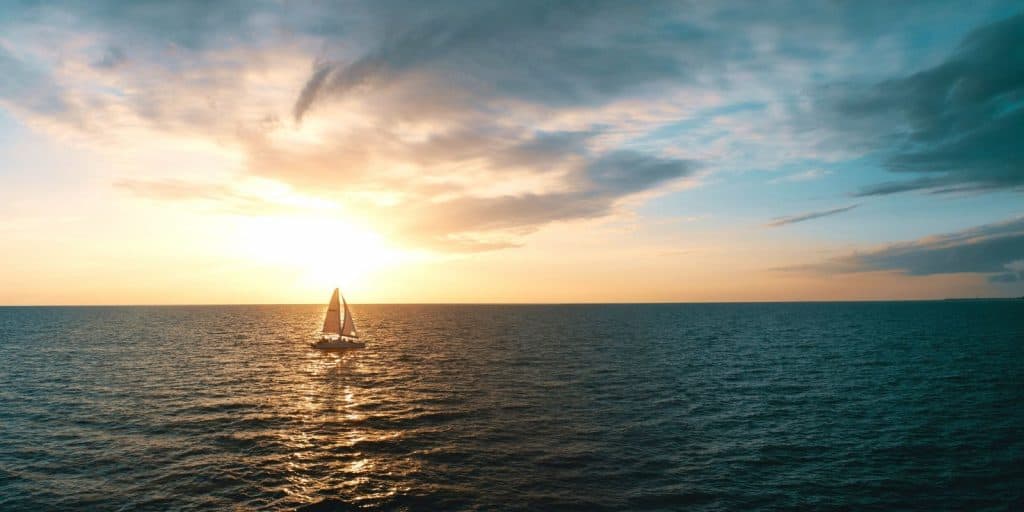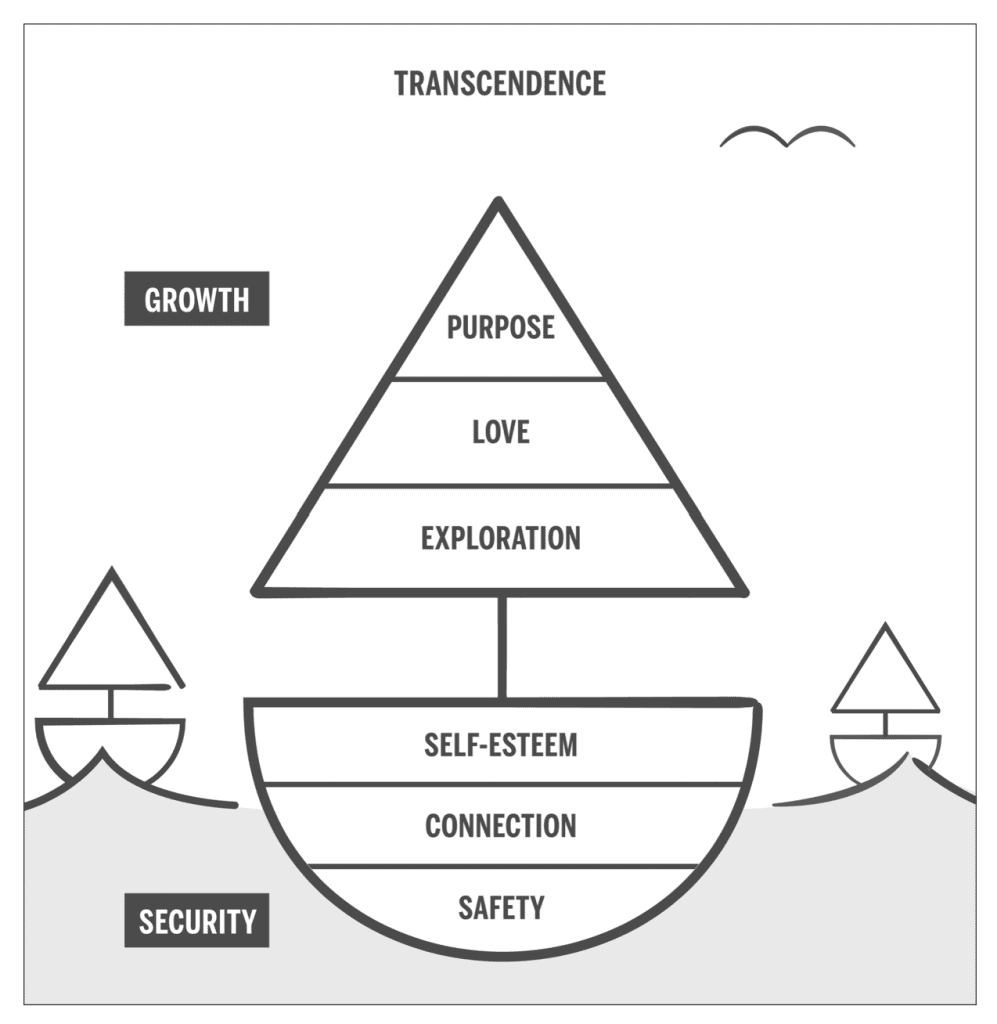Looking for the full book summary of Transcend by Scott Barry Kaufman? Here you go: The New Science of Self-Actualization: “Transcend” by Scott Barry Kaufman (Book Summary)
Did you know Maslow never put his hierarchy of needs into a pyramid?
Scott Barry Kaufman, humanistic psychologist and author of Transcend: The New Science of Self-Actualization (Amazon) believes it’s time for an update. Kaufman says:
I will present a new hierarchy of human needs for the twenty-first century that is in line with the spirit of humanistic psychology but is also grounded in the latest science of personality, self-actualization, human development, and well-being. I believe the new hierarchy of needs can serve as a useful organizing framework for the field of psychology as well as a useful guide for your own personal journey of health, growth, and transcendence.
If a pyramid is no longer necessary, then what do we need?
Life isn’t a trek up a summit but a journey to travel through—a vast blue ocean, full of new opportunities for meaning and discovery but also danger and uncertainty. In this choppy surf, a clunky pyramid is of little use. Instead, what is needed is something a bit more functional. We’ll need a sailboat.

Why we Need to Evolve Maslow’s Hierarchy of Needs from a Pyramid to a Sailboat Metaphor
The Sailboat Metaphor

“To use the sailboat metaphor, while we each travel in our own direction, we’re all sailing the vast unknown of the sea.”
- “Note that you don’t ‘climb’ a sailboat like you’d climb a mountain or a pyramid. Instead, you open your sail, just like you’d drop your defenses once you felt secure enough. This is an ongoing dynamic: you can be open and spontaneous one minute but can feel threatened enough to prepare for the storm by closing yourself to the world the next minute. The more you continually open yourself to the world, however, the further your boat will go and the more you can benefit from the people and opportunities around you.”
- “And if you’re truly fortunate, you can even enter ecstatic moments of peak experience—where you are really catching the wind. In these moments, not only have you temporarily forgotten your insecurities, but you are growing so much that you are helping to raise the tide for all the other sailboats simply by making your way through the ocean. In this way, the sailboat isn’t a pinnacle but a whole vehicle, helping us to explore the world and people around us, growing and transcending as we do.”
The Boat (Security Needs)
“As we sail through the adventure of life, it’s rarely clear sailing. The boat itself protects us from seas that are rarely as calm as we’d like.”
- “While safety is an essential foundation for feeling secure, adding on strong connections with others and feelings of respect and worthiness will further allow you to weather the storms.”
- “Research is clear that our psychological processes are deeply intertwined with our physiology. For that reason, I feel comfortable combining the physiological and safety needs that Maslow proposed. When safety needs are severely thwarted, people react in quite specific ways to restore balance, or homeostasis.”
The Sail (Growth Needs)
“Having a secure boat is not enough for real movement, however. You also need a sail. Without a sail, you might be protected from water, but you wouldn’t go anywhere. Each level of the sail allows you to capture more wind, helping you explore and adapt to your environment.“
- “The sail represents growth. While growth lies at the heart of self-actualization, one fair criticism of the term ‘self-actualization’ is that it is a vague hodgepodge of characteristics and motives lumped together under a single umbrella. Maslow recognized this, and in his later writings, he preferred the term ‘fully human’ to capture what he was really trying to get at.”
- “I have broken self-actualization—and therefore growth—into three specific needs for which there is strong contemporary scientific support: exploration, love, and purpose. I believe that these three needs capture the essence of how Maslow really conceptualized self-actualization.”
- “At the base of growth is the spirit of exploration, the fundamental biological drive that all growth needs to have as its foundation. Exploration is the desire to seek out and make sense of novel, challenging, and uncertain events. While security is primarily concerned with defense and protection, exploration is primarily motivated by curiosity, discovery, openness, expansion, understanding, and the creation of new opportunities for growth and development. The other needs that comprise growth—love and purpose—can build on the fundamental need for exploration to reach higher levels of integration within oneself and to contribute something meaningful to the world.”
- “With a secure foundation of safety, connection, and healthy self-esteem, and motivated by exploration and love, we are finally ready to strive toward a higher purpose that simultaneously benefits one’s own self and the world.”
The Seabird (Transcendence)
“From the perspective of Theory Z, you are able to look at all of the human needs—lovingly and nonjudgmentally—from the highest vantage point possible, viewing them not as separate from one another but as integrated and harmonious. This vantage point isn’t tethered to your own self or identity, although if need be, it can still clearly see all of it. Rather, it’s like the vantage point of a seabird, free to soar above or dive within the landscape of human experience, viewing it from any angle.”
- “At the top of the new hierarchy of needs is the need for transcendence, which goes beyond individual growth (and even health and happiness) and allows for the highest levels of unity and harmony within oneself and with the world. Transcendence, which rests on a secure foundation of both security and growth, is a perspective in which we can view our whole being from a higher vantage point with acceptance, wisdom, and a sense of connectedness with the rest of humanity.”
Where will you sail?
- “The good life is not something you will ever achieve. It’s a way of living. As Carl Rogers noted, ‘The good life is a process, not a state of being. It is a direction, not a destination.’ This process won’t always bring feelings of happiness, contentment, and bliss, and it may even sometimes cause pain and heartache. It’s not for the ‘faint-hearted,’ as Rogers notes, as it requires continually stretching outside your comfort zone as you realize more and more of your potentialities and launch yourself ‘fully into the stream of life.’ Just like it takes courage to open your sail on a sailboat and see where the winds will take you, it takes a lot of courage to become the best version of yourself.“
You May Also Enjoy:





